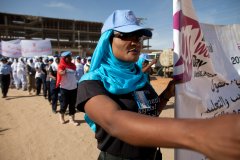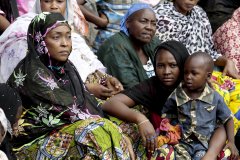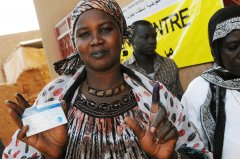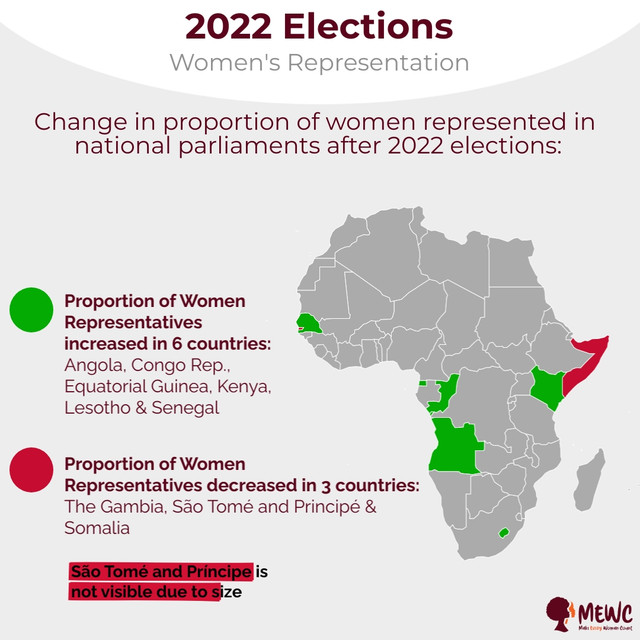Gender Issues Showlist
Women, Peace & Security
UNSCR 1325 calls on all parties to: protect and respect the rights of women and girls in conflict & post-conflict; increase women participation in all conflict resolution, peacekeeping and peace-building & to end impunity by prosecuting perpetrators of sexual and other violence on women and girls
index.php?option=com_content&view=category&id=56&Itemid=1913
Human Rights of Women
Thirty six years after the adoption of CEDAW, many women and girls still do not have equal opportunities to realize rights recognized by law. Women are denied the right to own property or inherit land. They face social exclusion, “honor killings”, FGM, trafficking, restricted mobility, early marriage,...
index.php?option=com_content&view=category&id=44&Itemid=1908
Violence Against Women
Violence against women is the most shameful human rights violation. Gender based violence not only violates human rights, but also hampers productivity, reduces human capital and undermines economic growth. It is estimated that up to 70 per cent of women experience violence in their lifetime
index.php?option=com_content&view=category&id=69&Itemid=1912
Political Participation & Leadership
Where women are fully represented, societies are more peaceful and stable. Women political participation is fundamental for gender equality and their representation in positions of leadership must be a priority for all Africans governments.
index.php?option=com_content&view=category&id=65&Itemid=1911
Latest News
- COTE D'IVOIRE: South-South Meeting to Promote Gender Equality and Combat Deforestation
- RWANDA: Rwanda Set to Launch Cervical Cancer Elimination Plan
- NIGERIA: Over 5,000 Nigerian Women Stranded in Iraq - Govt
- SUDAN: Healthcare Collapse Threatens Pregnant Women in Sudan's Sharg El Nil
- GHANA: President Nominates 12 More Ministers
- Senegal: Parliamentary election 2024
- Mauritius: Parliamentary election 2024
- Ghana: Presidential and Parliamentary Elections
- Botswana: Parliamentary elections 2024
- Algeria: Presidential Election 2024
CAMPAIGN: Take Action: Stop Torture In Health Care: Send A Letter To Namibia's Health Minister Demanding An End To The Forced And Coerced Sterilization Of Women Living With HIV
Source: Stop Torture in Health Care
Dear Minister:
I write to express my concern at the coerced and forced sterilisation of HIV positive women in public hospitals throughout Namibia. I further ask you to categorically condemn the practice and make clear to all healthcare professionals that such conduct will result in appropriate disciplinary action.
Reports of the coerced and forced sterilisation of HIV positive women in Namibia surfaced publicly as early as 2007. To date, dozens of HIV positive women from throughout Namibia have recounted their own experiences of being subjected to coerced and forced sterilisation. In all of the reported cases, informed consent was not properly obtained for one or more of the following reasons: consent was obtained under duress; failure to inform patient of the contents of the consent form; and a failure to provide full and accurate information regarding sterilisation procedure.
Subjecting HIV positive women to coerced and forced sterilisation undermines Namibia’s efforts to effectively respond to the HIV pandemic by increasing stigma and discrimination already facing HIV positive women. Such practices discourage HIV positive women from seeking healthcare services when it is critically needed.
Furthermore, the practice is contrary to Namibia’s domestic, regional and international legal obligations. These include the right to be free from cruel, inhuman, and degrading treatment; the right to liberty and security of person; the right to health and family planning; the right to privacy; and the right to equality and to be free from discrimination. These legal obligations are reinforced by medical guidelines issued by the International Federation of Gynecology and Obstetrics (FIGO), which specifically require information regarding the nature of the procedure, its consequences and risks, alternative options for family planning and its irreversible nature be provided prior to obtaining consent.
The coerced and forced sterilisation of HIV positive women has been going on for too long and I ask that you provide the necessary leadership to end this practice.
Sincerely,





